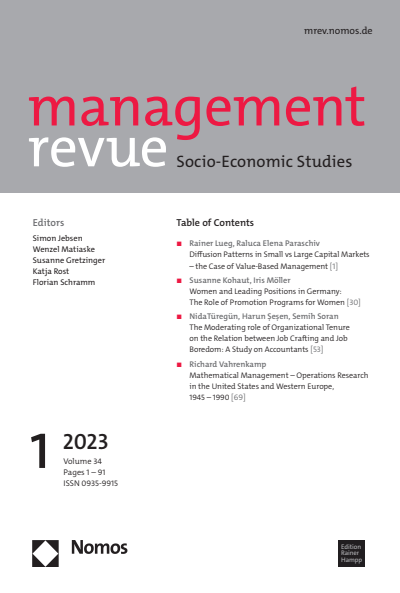Holacracy: A New Way of Organizing?
IF 1.7
0 MANAGEMENT
引用次数: 1
Abstract
Organizations have to act in environments that are constantly becoming more insecure, dynamic, and competitive. Practitioner and scholar literature continue to call for and explore new work arrangements. The concept of Holacracy - often referred to as a ‘new form of organizing’ - represents a reaction to the increasing complexity and environmental dynamics that organizations have to deal with. It promises a new way to run organizations and aims to replace traditional hierarchical and bureaucratic structures in organizations with decentralized authority and self-organization. This article looks beyond the recent hype about Holacracy and analyses what is actually novel about the concept. In specific, we aim at identifying the core principles of the concept and discuss them against the background of bureaucratic and post-bureaucratic approaches to review whether and how Holacracy deviates from these two approaches. We do so by applying a qualitative analysis method where the book ‘Holacracy’ was subjected to content analysis. The results of this paper demonstrate that - given the high degree of formal standardization - the concept itself is still bureaucratic, although with certain modifications, especially regarding participative decision-making processes. Further, our results demonstrate that Holacracy has a very unique and unprecedented interpretation of power and authority, which requires more intensive empirical research and analysis.全体统治:一种新的组织方式?
组织必须在不断变得更加不安全、动态和竞争的环境中行动。从业者和学者文献不断呼吁和探索新的工作安排。Holacracy的概念——通常被称为“一种新的组织形式”——代表了对组织必须应对的日益复杂和环境动态的一种反应。它承诺了一种管理组织的新方式,旨在用分散的权力和自组织取代组织中的传统等级和官僚结构。这篇文章超越了最近关于“全体统治”的炒作,分析了这个概念的真正新颖之处。具体而言,我们旨在确定这一概念的核心原则,并在官僚主义和后官僚主义方法的背景下讨论它们,以回顾全体统治是否以及如何偏离这两种方法。我们采用定性分析方法,对《Holacracy》一书进行内容分析。本文的结果表明,鉴于高度的正式标准化,这一概念本身仍然是官僚主义的,尽管有某些修改,特别是在参与性决策过程方面。此外,我们的研究结果表明,Holacracy对权力和权威有着非常独特和前所未有的解释,这需要更深入的实证研究和分析。
本文章由计算机程序翻译,如有差异,请以英文原文为准。
求助全文
约1分钟内获得全文
求助全文
来源期刊

Management Revue
MANAGEMENT-
CiteScore
1.20
自引率
0.00%
发文量
7
期刊介绍:
Management Revue - Socio-Economic Studies is an interdisciplinary European journal that undergoes peer review. It publishes qualitative and quantitative work, along with purely theoretical papers, contributing to the study of management, organization, and industrial relations. The journal welcomes contributions from various disciplines, including business and public administration, organizational behavior, economics, sociology, and psychology. Regular features include reviews of books relevant to management and organization studies.
Special issues provide a unique perspective on specific research fields. Organized by selected guest editors, each special issue includes at least two overview articles from leaders in the field, along with at least three new empirical papers and up to ten book reviews related to the topic.
The journal aims to offer in-depth insights into selected research topics, presenting potentially controversial perspectives, new theoretical insights, valuable empirical analysis, and brief reviews of key publications. Its objective is to establish Management Revue - Socio-Economic Studies as a top-quality symposium journal for the international academic community.
 求助内容:
求助内容: 应助结果提醒方式:
应助结果提醒方式:


